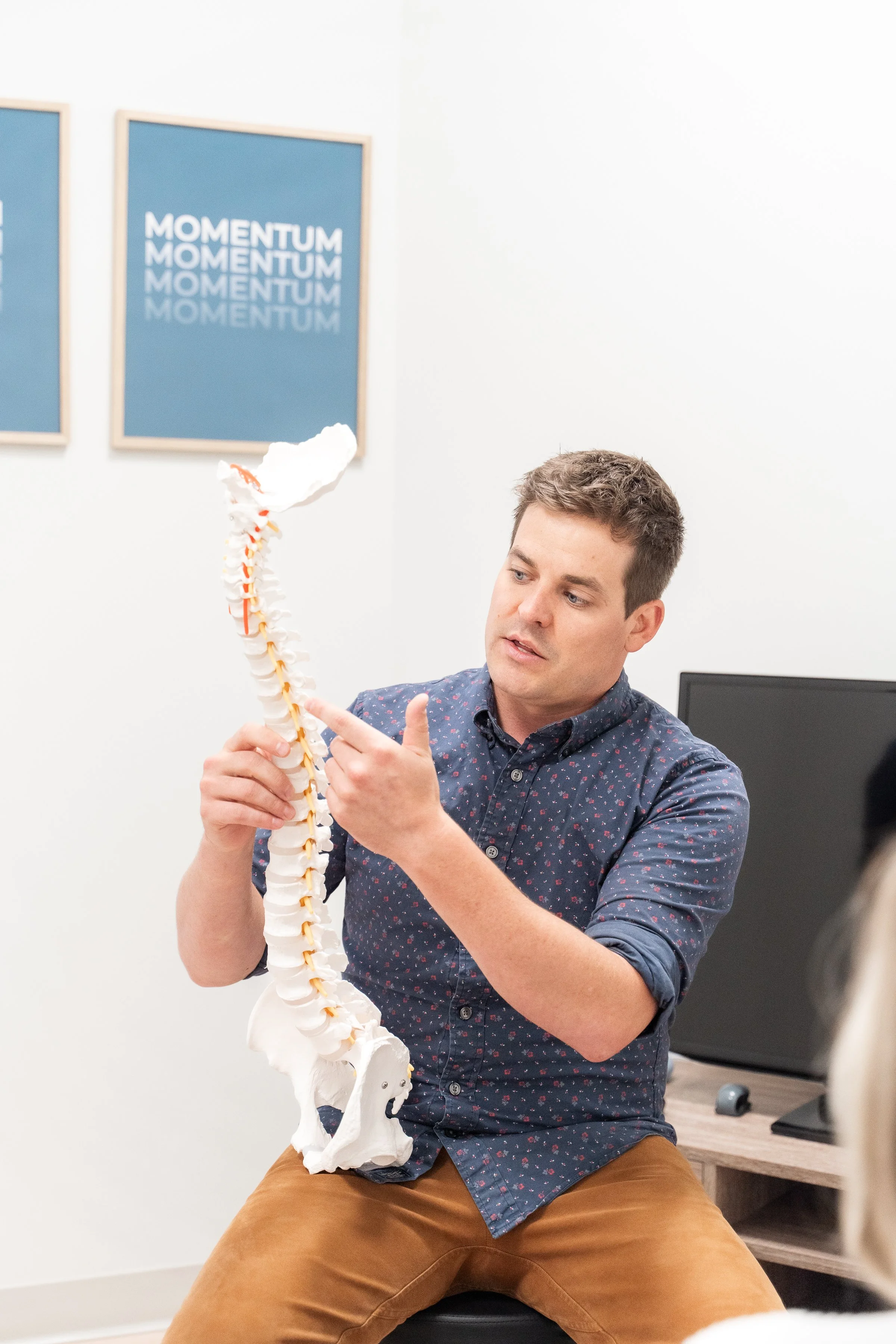A Calgary Chiropractor’s Blog

Disc Injury Calgary: A Straightforward Guide
Disc injuries (like bulging, herniated, or slipped discs) in Calgary involve pain from spinal discs, often treated conservatively with chiropractic care (adjustments, spinal decompression) and exercises to relieve nerve pressure. With clinics like Axiom Chiropractic offering tailored programs. Prompt treatment is key to prevent worsening issues.

Tech Neck Exercises: 5 Minute Reset
To fix tech neck, focus on strengthening deep neck muscles and stretching tight chest/neck muscles with exercises like head extensions, wall angels, doorway chest stretches, and shoulder blade squeezes. Regular movement and chiropractic adjustments are also key to relieving strain from forward head posture and prolonged sitting.

Are chiropractors allowed to call themselves Dr. (Doctor)?
Yes, chiropractors are legally allowed to use the title "Doctor" (Dr.) in many places, including all of Canada and the U.S., because they earn a doctoral degree (Doctor of Chiropractic - DC) and are licensed healthcare professionals, but it can be confusing as they aren't medical doctors (MDs) and don't practice medicine like prescribing drugs or surgery, focusing instead on spinal adjustments and movement. The usage is regulated, with laws often specifying that the title applies within their licensed scope, but it's common for the public to mistake them for medical doctors, leading to debate.

Can I claim a Calgary chiropractor on my taxes?
Yes, you can generally claim the cost of a chiropractor as an eligible medical expense on your Canadian income tax return, provided the practitioner is licensed in their province or territory.
This expense contributes to the Medical Expense Tax Credit (METC), which can help reduce the amount of tax you owe.

When should you see a Calgary chiropractor?
You should see a chiropractor for persistent back/neck pain, headaches, stiffness, or pain radiating down limbs, often following injuries like whiplash, or for improving posture, mobility, and energy levels by addressing spinal issues. It's also beneficial after accidents, for sciatica, or even preventatively to maintain musculoskeletal health and nervous system function, but avoid if you have severe conditions like tumors, severe osteoporosis, or certain spinal/vascular issues, consulting a doctor first.

Can a Calgary chiropractor help with vertigo?
Yes, a chiropractor can help with vertigo by addressing its underlying causes, such as misalignments in the cervical spine or issues with the inner ear. Treatment may involve gentle spinal adjustments, specific maneuvers like the Epley maneuver for inner ear problems, and vestibular rehabilitation exercises to improve balance and stability.

What to wear to a Calgary chiropractor
Wear loose-fitting, comfortable clothing that allows for easy movement, such as athletic wear or sweatpants and a t-shirt. Avoid restrictive items like tight jeans, heavy jackets, or bulky jewelry, and opt for comfortable, flat shoes that are easy to remove.

How much does a chiropractor in Calgary cost without insurance?
Without insurance, the cost for a chiropractor visit typically ranges from $60 to $250 per session, with initial consultations often being more expensive than follow-up appointments. Factors like location, the specific clinic, and the type of treatment (such as X-rays or additional services like massage) will affect the final price.

How to Find a Good Chiropractor in Calgary
To find a good chiropractor in Calgary, start by asking for recommendations from friends and family, and check online reviews on sites like Yelp or Google. Once you have a list, look at their websites to get a feel for the practice and schedule an initial consultation to ensure you feel comfortable with the doctor's approach, communication style, and experience with your specific health issues.

Can a Calgary chiropractor Fix a Pinched Nerve?
Yes, a chiropractor can often help with a pinched nerve by using techniques like spinal adjustments to relieve pressure on the nerve. This non-invasive, drug-free approach aims to fix the underlying spinal misalignments that cause the compression, restoring proper nerve function and reducing pain, numbness, or tingling. However, effectiveness depends on the cause and severity, and alternative treatments may be necessary for severe cases like spinal degeneration.

Chiropody vs. Chiropractic
A chiropodist is a specialist in diagnosing and treating foot and lower limb issues, while a chiropractor focuses on the spine, joints, and the musculoskeletal system as a whole. A chiropodist addresses problems like corns, calluses, ingrown toenails, and bunions through treatments including orthotics, minor surgery, and therapeutic methods. A chiropractor uses spinal manipulation and adjustments to treat conditions such as back and neck pain, headaches, and general joint pain.

Can a Calgary Chiropractor Help With Scoliosis?
Yes, a Calgary chiropractor can help manage scoliosis by addressing symptoms like pain and stiffness and improving spinal function, although they cannot fully correct the structural curvature of the spine. A Calgary chiropractor can use manual adjustments, corrective exercises, and lifestyle advice as a non-invasive, drug-free approach to improve spinal alignment, enhance mobility, and slow the progression of the curve.

Can a Calgary Chiropractor Help With Low Back Pain?
Yes, a chiropractor can help with lower back pain by using spinal manipulations and other techniques to improve spinal function, reduce inflammation, and increase mobility. This approach can relieve pain by addressing the root causes of discomfort, such as poor posture, injuries, or muscle tension.

Should You Let a Chiropractor Adjust Your Neck?
Whether or not to let a chiropractor adjust your neck is a personal decision that should be made in consultation with a healthcare professional. While chiropractic adjustments can be effective for some types of neck pain and related issues, it's important to be aware of potential risks and discuss them with your doctor or chiropractor.

What is Webster Technique in Chiropractic?
The Webster Technique is a specific chiropractic analysis and adjustment used during pregnancy to reduce the effects of sacral and pelvic misalignment, also known as subluxation and sacroiliac (SI) joint dysfunction. It aims to improve neurobiomechanical function in the sacral/pelvic region, potentially aiding in labor and delivery. The technique involves gentle adjustments and soft tissue work focused on the sacrum, pelvis, and surrounding muscles and ligaments.

Is there any science behind chiropractic adjustments?
Yes, there is science behind chiropractic adjustments, particularly in the areas of biomechanics, neurology, and pain management. While the field has evolved from its initial, sometimes pseudoscientific, foundations, modern chiropractic care has incorporated scientific principles and research findings.

Pinched Nerve or Herniated Disc: What’s The Difference?
A pinched nerve is when a nerve is compressed by surrounding tissues, while a herniated disc is when the soft inner core of a spinal disc pushes through the outer layer. Essentially, a pinched nerve is a general term for nerve compression, and a herniated disc is one specific cause of a pinched nerve.

Do Chiropractors Cause Strokes?
While there is no direct evidence that chiropractic care causes strokes, studies show a non-causal association between neck manipulation and vertebrobasilar artery (VBA) strokes, particularly in young adults under 45. This association is likely due to patients seeking chiropractic care for the early symptoms of an arterial dissection, which can lead to stroke. The risk appears similar to that of seeing a primary care physician for similar symptoms.

Can a Calgary Chiropractor Help with Ehlers-Danlos Syndrome?
Chiropractic care can be a part of a management plan for some individuals with Ehlers-Danlos Syndrome (EDS), but it's crucial to choose a practitioner experienced with EDS and to opt for low-force adjusting techniques to minimize risks associated with joint instability and tissue fragility. A team approach, including physical therapy, can also be beneficial for improving stability and function.

